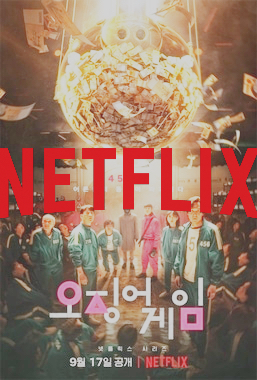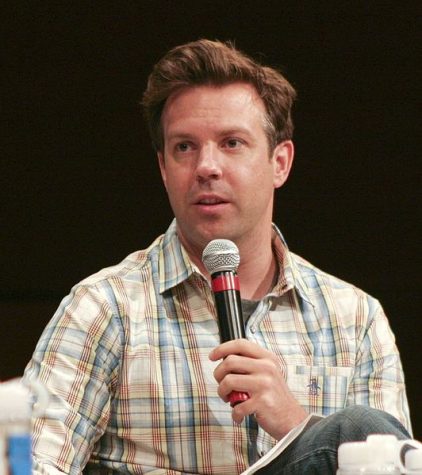“Squid Game” stuns viewers with elaborate plot; offers opportunity for societal reflection

Gracie Watt / Hilltop Views Mashups
“Squid Game” is a Korean drama directed by Hwang Dong-hyuk. It premiered on Netflix Sept. 17 and almost instantly gained global popularity.
Let the Games Begin
“Squid Game” is a Korean drama series aired by Netflix that tackles the theme of financial inequality through brutal versions of children’s games. The original series is the highest rated Korean drama on Netflix, with a 100% rating on Rotten Tomatoes.
The first episode sets up the tone for the rest of the series when the audience is introduced to the main protagonist Seong Gi-hun, a divorced father who is indebted to loan sharks while living with his mother. In the episode, Gi-hun steals his mother’s wallet in order to bet on horse races. After a nasty confrontation with loan sharks, Gi-hun has an odd encounter with a stranger.
He is offered the opportunity to participate in a series of children’s games in order to compete for a $40 million cash prize. Along with 456 other indebted players, Gi-hun begins his journey to win the money. At the facility where the games are held, Gi-hun meets and teams up with childhood friend and businessman, Cho Sang-woo; Pakistani immigrant, Ali; pickpocket, Kang Sae-byeok and elderly man with a brain tumor, Oh Il-nam.
Together they compete in a series of violent and deadly games in which their actions have permanent consequences. As the characters navigate the dystopian competition, they are reminded of their own morality.
Besides the brutality in the plot, the characters are compelling on their own. Each has their own reasons for competing in the games. The writing will have you forget that these characters only exist in the show. Their circumstances and pain are a true reflection of what many people experience under capitalism.
Themes in Squid Game
“Squid Game” is more than just a game, but rather a critique on struggles that many face in a capitalistic society. Financial inequality remains a theme throughout the show, with the dog-eat-dog mentality that many of the characters employ in order to ensure their survival.
The games seek to provide “equal opportunity” to the players, but more often than not we’re left wondering what equalities the characters are actually being offered. We see the characters deal with selfishness and greed, and even witness some lose their humanity completely.
Other themes the show touches on are organ trafficking and power and class struggles. We see that even in the game ecosystem, power and class struggles persist. With a few characters playing unfairly, the show proves that even in a system designed to be equal, inequality is rampant.
Set Design and Production
The sets in the series where the characters compete are a colorful contrast to the rest of the colorless, uniform facility. The set design draws the viewers in with its attention-grabbing colors and detail orientation.
From sets that are designed to reflect an outside playground, a chessboard and a neighborhood, the production is a stunning reflection of all the hard work that went into creating the show. The music, props and costumes are all striking and work together to make this fictional game real.
The actors are forces demanding to be viewed. Lee Jung-jae, Park Hae-soo, Oh Yeong-su, Jung Ho-yeon and Anupam Tripathi all play main characters in this brutal drama. They all put on impressive performances that only make the story more compelling.
More like “Squid Game”
- “Alice in Borderland”
- “Kingdom”











